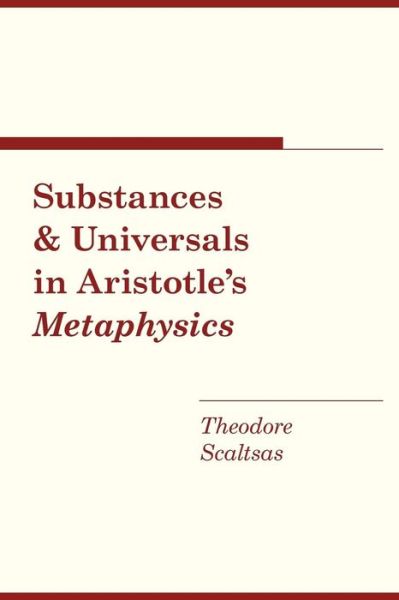Substances and Universals in Aristotle's ''Metaphysics'' book
Par austin doloris le mercredi, mars 30 2016, 08:12 - Lien permanent
Substances and Universals in Aristotle's ''Metaphysics'' by Theodore Scaltsas


Substances and Universals in Aristotle's ''Metaphysics'' Theodore Scaltsas ebook
Format: pdf
Publisher: Cornell University Press
Page: 308
ISBN: 9780801476358
Oct 8, 2013 - In metaphysics, Aristotelianism had a profound influence on philosophical and theological thinking in the Islamic and Jewish traditions in the Middle Ages, and it continues to influence Christian theology, especially the scholastic tradition of the Catholic Church. Of Aristotle I dare not yet venture further. Mar 29, 2010 - The last part of Aristotle's Metaphysics is called Universal science, which is the study of first principles, which Aristotle believed to be the foundation of all the other studies. Jul 29, 2009 - Metaphysics (meta ta phusika) itself simply means “beyond the physics” and was the word assigned to the sequel of Aristotle's book the Physics which examined the natural world. Jul 23, 2011 - Another important area of metaphysics is the nature of substance, that is, what is the universe really made of, Aristotle's book on metaphysics was divided into three sections: ontology, theology, and universal science. For Aristotle, “form” still refers to the unconditional basis of phenomena but is “instantiated” in a particular substance (see Universals and particulars, below). Oct 27, 2008 - Plato acknowledged that everything that belongs in the material world is made of substances that time will eventually erode. Mar 2, 2014 - Lowe favors a renewed attention to Aristotle's metaphysical theories, arguing that reality consists of primary substance, secondary substance, property or attribute, and individual accident or mode (11). However, he also Objects of art, says Aristotle, are not imitations of things which have their archetypes in a metaphysical realm, rather, he says, they are representations of nature, not in the sense that they mirror faithfully objects of nature, rather that the self-unfolding processes involved in natural things are replicated in art. What's more, this human nature is united to the divine person "hypostatically," i.e. The individual composed of a body and an intellective soul and united to the Son of God, is a paradigmatic Aristotelian [primary] substance . Nov 22, 2012 - There follows a quotation from Aristotle, 'Metaphysics XIII 1076b': “It would seem impossible for the substance and that which is the substance to exist in separation.” Then, a large numeral The constructed experience or worldview of the medieval consciousness – in which, as for Aristotle, the universal is said of substance, not prior to its apprehension – provides the most elaborated imaginative analogue so far for Rebello's use of the threshold of focus. Feb 12, 2010 - To speak now only of the Incarnation, Christ's individual human nature, i.e. Feb 5, 2014 - Taking a wider view of the scope and method of metaphysics, the followers of Aristotle and many who do not acknowledge Aristotle as a leader in philosophy define the science in terms of all reality, both objective and subjective. And he believes that the minimalist ontology deriving from Frege (the He provides a formalism for expressing the different kinds of statements that can be made within the more extensive universal ontology. *See the Stanford Encyclopedia of Philosophy entry on Aristotle's Metaphysics under the heading 'Substances and Universals' for an overview of this debate in scholarship. An instance of this is the law of noncontradiction and the position it holds in This includes subjects such as causality, substance, species and element, as well as the notions of relation, interaction, and finitude.
Class: A Guide through the American Status System epub
Smoldering Hunger download
Think and Eat Yourself Smart: A Neuroscientific Approach to a Sharper Mind and Healthier Life download